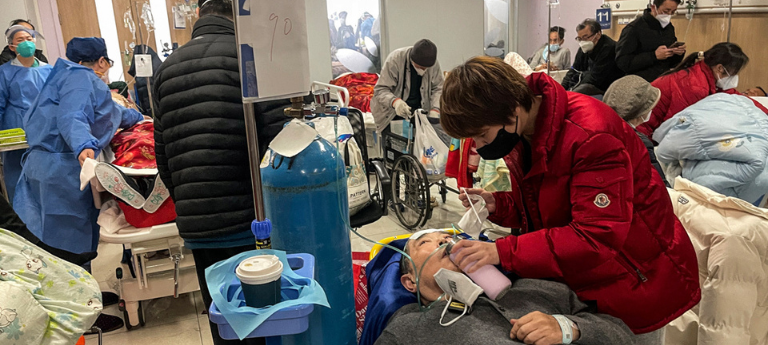BEIJING: State media reported on Tuesday that many areas of China have already passed their COVID-19 infection peak. Despite international concerns about the outbreak’s scale and impact, officials continued to downplay its severity.
According to a summary provided by Health Times, a publication managed by People’s Daily, the official newspaper of the Communist Party, infections have been decreasing in Beijing and several Chinese provinces. According to one official, nearly all 100 million people in Henan province had already contracted the disease.
Since a policy change at the beginning of December in response to protests against a three-year-old “zero-COVID” regime, the virus has spread freely in China. On Sunday, China reopened its borders and lifted the last significant restrictions.
The world’s second-largest economy has experienced one of its slowest growth rates in nearly 50 years as a result of the numerous lockdowns, incessant testing, and various levels of movement restrictions since the beginning of 2020. This has caused widespread distress.
Since changing its policy, China has reported fewer than five deaths per day and stopped publishing daily infection counts as the virus spread. The World Health Organization disputes these numbers.
International health experts anticipate at least 1 million COVID-related deaths in China this year, and many Chinese funeral homes and hospitals report being overwhelmed.
A compilation of reports from local government officials and health professionals across the country that was published in Health Times on Tuesday suggested that the COVID wave may have reached its limit in many areas.
According to reports, the infection rate in the central province was nearly 90% as of January 6, according to Kan Quan, director of the Office of the Henan Provincial Epidemic Prevention and Control. He stated, without providing any additional details, that while the number of patients attending clinics in the province reached its highest point on December 19, there were still a lot of severe cases.
According to reports, Beijing’s acting mayor, Yin Yong, also stated that the capital was past its peak. According to Li Pan, deputy director of the Municipal Health Commission in Chongqing, the peak occurred on December 20.
The peak occurred on December 22 in the province of Jiangsu, and officials stated that “the first wave of infections has passed smoothly” in the province of Zheijiang. Before the end of the year, two cities in the southern province of Guangdong, China’s manufacturing capital, reached their peak.
Separately, a prominent health official stated in the state-run China Daily that the percentage of severe cases remained unknown.
According to a statement made by Wang Guiqiang, the head of the infectious disease department at Peking University First Hospital, “It is still too early to conclude the overall percentage of severe and critical COVID patients in China because different types of hospitals report different numbers.”
Pfizer criticism
China has stated that any future mutations are likely to be more infectious but cause less severe illness, and that any criticism of its data is politically motivated attempts to smear its “success” in managing the pandemic.
The foreign ministry criticized the “discriminatory” testing requirements implemented by the United States, Japan, South Korea, Britain, and France in response to China’s COVID outbreak.
The yuan reached a nearly five-month high on Tuesday as financial markets perceive the new restrictions as merely an inconvenience.
Shop owners from South Korea and Japan, tour bus operators from Thailand, and K-pop groups were among those salivating at the prospect of more Chinese tourists.
Officials have threatened retaliation against nations that require tests for Chinese visitors, even though Beijing also requires negative COVID test results from people arriving in China.
On Tuesday, the Chinese embassy in South Korea announced that it would no longer issue Korean citizens with short-term visas.
The price of Paxlovid, Pfizer Inc.’s COVID treatment, has also been criticized by state media.
In an editorial, the nationalist tabloid Global Times stated, “It is not a secret that U.S. capital forces have already accumulated quite a fortune from the world via the sale of vaccines and drugs, and the U.S. government has been coordinating all along.”
Albert Bourla, CEO of Pfizer, stated on Monday that the company was in talks with Chinese authorities regarding Paxlovid’s price, but not about licensing a generic version in China.
China’s health system is ill-prepared as a result of the abrupt shift in COVID policy. Many hospitals are ill-equipped to handle patients in critical conditions, and smaller cities are scrambling to acquire basic anti-fever medication supplies.
According to Reuters, Youcare Pharmaceutical Group chairman Yu Weishi stated that his company increased daily production of its anti-fever medications by fivefold to one million boxes.
Another pharmaceutical company’s general manager, Wang Lili, told Reuters that intravenous drips were their most popular product.
Since January 5, the company has eliminated weekends to meet demand.
Wang stated, “We are running 24/7.”






